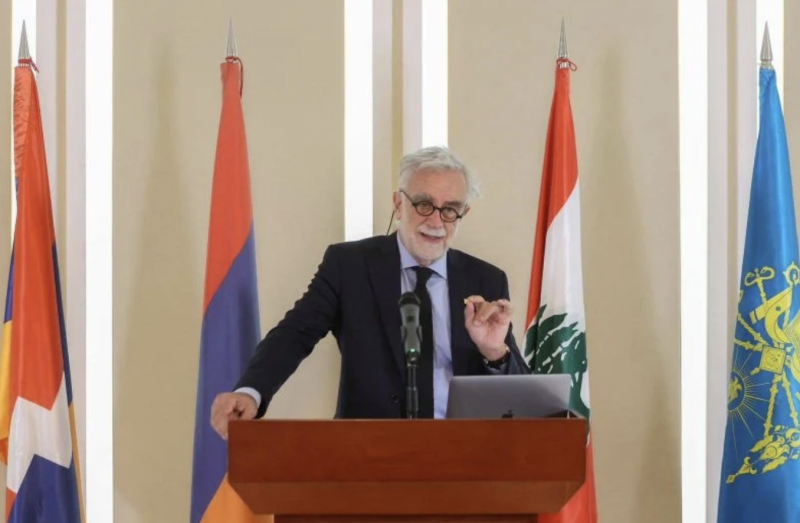
Luis Moreno Ocampo in Lebanon. (Credit: Luis Moreno Ocampo)
Luis Moreno Ocampo served as the first prosecutor at the International Criminal Court (ICC) from 2003 to 2012. He spent a few days in Lebanon just before the commemoration of the Armenian genocide on April 24.
In August 2023, the Argentine lawyer said in his report that the Azerbaijani government had committed acts of genocide between 2022 and 2023 during the blockade of the Lachin Corridor in the Nagorno-Karabakh region. The report came out just before Baku’s lightning offensive that led to the dissolution of the self-proclaimed republic and the exodus of over 100,000 Armenians.
The former ICC judge, now a researcher at Harvard University’s Carr Center for Human Rights Policy, spoke to L’Orient-Le Jour about the conflict between Armenia and Azerbaijan through the lens of international law.
Why did you come to Beirut just before April 24, the date that commemorates the Armenian genocide?
The Armenian Patriarchate of Lebanon invited me. I think it was important during this turbulent period for the region. Last year, the Genocide Convention celebrated its 75th anniversary. At the same time, the UN Special Adviser on the Prevention of Genocide warned that six genocides are still taking place in the world. There is something very wrong. It’s astonishing that more than a century after the Armenian genocide began, we’re still facing it today. So I need to get out there and speak out so that what’s taking place in the Nagorno-Karabakh region is not masked. It’s of the utmost importance.
How and why did you become interested in Armenia?
In the beginning, my Armenian friends asked me how I could characterize what was happening in the Nagorno-Karabakh region, then under the Azerbaijani blockade. As I enquired, I discovered that it was a real genocide. That’s not just my opinion. The ICC also declared that the blockade of the Lachin Corridor, which the Azerbaijani army imposed and prevented the Armenian population from obtaining food, oil and necessities, was essentially aimed at exterminating them. The Armenian community, which is present all over the world, helps to raise awareness on this subject and to alert people about the genocides that are currently spreading to Tigrayans, Ethiopians and Burmese... because nobody is talking about them.
What evidence do you have that a genocide is still underway against the Armenians? How is this different from ethnic cleansing?
Western countries don’t like to acknowledge genocide. The expression “ethnic cleansing” is widely used because it avoids the taboo word. Ethnic cleansing to destroy a community is nevertheless genocide. Genocide does not necessarily involve killing large numbers of people; it can also involve inflicting unbearable conditions on a threatened community. This is what happened during the Lachin blockade, to which I devoted a report and which, incidentally, alerted the US Congress. The Azerbaijani army’s Sept. 19 attack forced the last inhabitants of the Nagorno-Karabakh region to leave, reinforcing the impression of genocide, with serious psychological damage. Thousands of people fled, leaving behind their belongings, homes and land, to protect their lives from the bombs. There is a clear intention to destroy a community by uprooting it. As long as the Armenians have not returned to the Nagorno-Karabakh region, the fact that there is genocide will remain unchanged.
In a genocide, the intentionality of acts is very important. Judge Gassia Apkarian, practicing in the US and the Lebanese-Armenian granddaughter of a survivor of the 1915 genocide, recently submitted a case to the ICC to investigate Azerbaijan President Ilham Aliyev. She proved through his statements that he would expel Armenians from their lands, and not just from the Nagorno-Karabakh region. She cited a declaration by the Azerbaijani Parliament that fundamentally denies the existence of Armenians, claiming that the whole of Armenia represents Western Azerbaijan. Today, there is reason to believe that a warrant against Aliyev could be issued by the ICC.
An investigation is still underway at the International Court of Justice (ICJ) after the two countries filed racial discrimination cases. What stage have the proceedings reached?
The ICJ is now giving both parties time to present their final arguments. It will therefore take at least another two years for each side to present its case, and a decision will probably take an additional two years. However, as the claims relate to discrimination, the issue of genocide has not been addressed. Yet it’s very important to put the right word on what’s going on, and not wait for legal proceedings that will take years. There is a lack of responsiveness on the part of the international community, as political and economic interests represent a limit to the progress of legal cases. Historically, states have ignored international issues and focused on their interests. When South Africa, a so-called emerging country, took Israel to the ICJ for genocide in the Gaza Strip in December 2023, the message was strong.
Given Israel’s war in Gaza, do you see any similarities between the Armenian and Palestinian files?
As a signatory to the Genocide Convention, Israel must prevent the risk of genocide. But the country is already failing in its duty. The ICC has already opened an investigation in 2021 and may soon issue international arrest warrants. These could eventually target Prime Minister Benjamin Netanyahu and members of his far-right government, who are using the war against Hamas to kill the Palestinian population en masse.
This article was originally published in L'Orient-Le Jour. Translated by Joelle El Khoury.